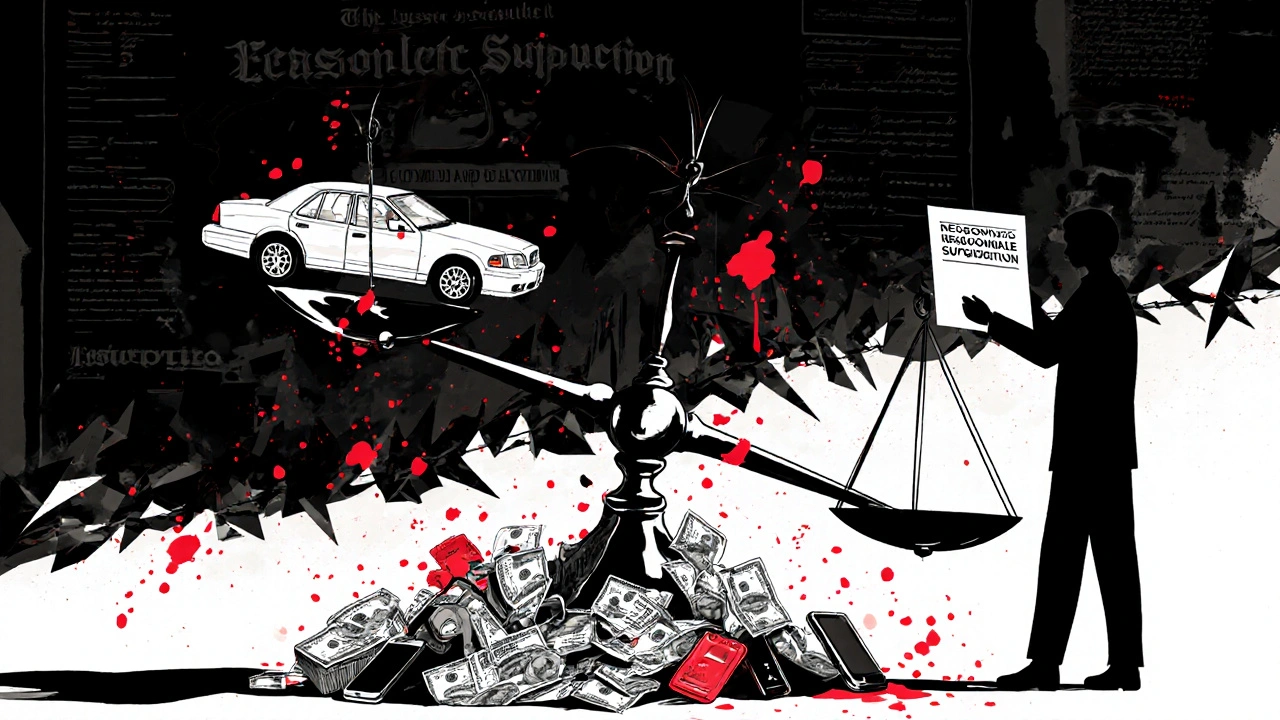When police seize your car, cash, or phone because they suspect it’s connected to sex work, they don’t need to prove you committed a crime. That’s civil forfeiture-and it’s happening more often than most people realize. Unlike criminal charges, which require proof beyond a reasonable doubt, civil forfeiture targets property, not people. And in places where sex work is criminalized or heavily restricted, it’s become a tool to punish without trial.
How Civil Forfeiture Works in Sex Work Cases
Civil forfeiture lets law enforcement take money, vehicles, electronics, or even homes if they believe those items were used in or gained from illegal activity. In sex work cases, this often means grabbing cash from a hotel room, confiscating a car used to get to appointments, or seizing a smartphone with client messages. You don’t have to be arrested. You don’t have to be charged. You don’t even have to be convicted. All they need is a reasonable suspicion-and sometimes, not even that.
In the U.S., federal law allows forfeiture under the Controlled Substances Act and other statutes, even when no drug crime is involved. Many states have similar rules. In Australia, while federal law doesn’t permit civil forfeiture for sex work alone, some states use proceeds of crime laws to target assets linked to ‘illegal sexual services’ under local ordinances. In places like New South Wales, where selling sex isn’t illegal but operating a brothel is, police have used asset seizure to pressure sex workers into giving up their livelihoods.
One 2023 case in Texas involved a woman who drove her own car to meet clients. Police stopped her, found $800 in cash, and seized the vehicle. She wasn’t arrested. She wasn’t charged. But she had to pay $2,000 in legal fees just to get her car back-and lost the case because she couldn’t prove the money wasn’t from sex work. That’s civil forfeiture in action: the burden of proof falls on you, not the state.
Why Sex Workers Are Disproportionately Affected
Sex workers are uniquely vulnerable to civil forfeiture because their work often involves cash, private transportation, and digital communication-all things police can easily label as ‘instrumental to crime.’ Unlike other informal workers, sex workers rarely have formal contracts, bank records, or receipts to prove income sources. Many avoid banks entirely to stay under the radar. That makes it nearly impossible to show where money came from.
Police also target devices. A phone with encrypted messaging apps, contact lists of clients, or calendar entries labeled ‘appointment’ can be seized as evidence of illegal activity-even if the underlying act isn’t illegal in that jurisdiction. In 2022, a sex worker in Vancouver had her laptop taken after police found a single message saying, ‘See you at 8.’ She spent six months fighting to get it back. The court ruled the message alone wasn’t proof of illegal activity, but she lost her job during the process.
There’s also a pattern of targeting marginalized groups. Trans women, migrants, and people of color are far more likely to be stopped, searched, and have assets seized-even when data shows no higher rates of criminal activity. A 2024 report from the Global Network of Sex Work Projects found that 68% of sex workers who experienced asset seizure were racialized or undocumented. These aren’t random incidents. They’re systemic.
What Can Be Seized-and How Hard It Is to Get It Back
Common items targeted in civil forfeiture cases include:
- Cash (especially in denominations under $100)
- Personal vehicles (cars, motorcycles, scooters)
- Smartphones and laptops
- Bank accounts with frequent cash deposits
- Hotel rooms rented under your name
- Professional tools (lubricants, condoms, clothing, lighting equipment)
Getting anything back is a legal nightmare. You typically have 30 to 90 days to file a claim, depending on the jurisdiction. You’ll need a lawyer. You’ll need documents. You’ll need to prove the property wasn’t used for illegal purposes. In many places, the cost of legal representation exceeds the value of the seized item. Many people just walk away.
In Australia, the process is slightly different. Under the Proceeds of Crime Act, authorities must prove the asset was derived from or used in a ‘serious offence.’ But sex work itself isn’t classified as a serious offence-unless it’s linked to trafficking, underage activity, or operating an unlicensed brothel. Even then, the threshold for seizure is low. Police don’t need to charge anyone. They just need to convince a magistrate that there’s a ‘reasonable suspicion’ the property is connected to criminal activity. That’s it.

Legal Loopholes and How Police Use Them
Police rely on three key loopholes:
- ‘Instrumentality’ doctrine: Anything that helped the crime happen can be seized-even if it’s not illegal on its own. A car, a phone, a bedsheet.
- ‘Proceeds’ theory: Any money you earned can be taken if it’s linked to an illegal activity-even if you didn’t know the activity was illegal.
- ‘Third-party’ liability: If your partner, roommate, or family member uses your property for sex work, you can lose it-even if you had no knowledge.
One 2023 case in Ohio involved a grandmother whose home was seized because her granddaughter used the spare room for sex work. The grandmother had no involvement. She had no idea. But the house was sold at auction. She lost everything.
Another tactic is ‘pretext stops.’ Police pull over a car for a minor traffic violation-like a broken taillight-and then search it. If they find condoms, cash, or a client list, they seize everything. In 2024, a study by the University of California found that 41% of sex workers who had assets seized reported being pulled over for minor infractions first.
What You Can Do to Protect Yourself
There’s no foolproof way to avoid civil forfeiture-but there are steps that reduce your risk:
- Use digital payment systems: Cash is the biggest red flag. Use encrypted apps like Cash App or PayPal (with caution) to create a paper trail. Even if it’s flagged, it’s harder to seize than unmarked bills.
- Keep records: Save receipts, emails, or screenshots showing income from other sources. If you have a side job, document it. This helps prove where money came from.
- Separate your assets: Don’t use your personal car or phone for work. Use a burner phone, a rideshare, or a friend’s car. If you’re forced to use your own, keep work-related items in a locked compartment.
- Know your rights: You don’t have to consent to a search. You don’t have to answer questions. Say, ‘I’m not answering without a lawyer.’ Record the interaction if you can.
- Connect with advocacy groups: Organizations like the Global Network of Sex Work Projects or local sex worker unions can help you find legal aid. Many offer free consultations for civil forfeiture cases.
Some sex workers in Australia now use ‘legal risk kits’-small packets with printed copies of local laws, contact info for legal hotlines, and sample scripts for police interactions. They’re not perfect, but they’ve helped several people avoid asset seizure by simply knowing what’s legal.

Changing the System
Decriminalization is the only real solution. Where sex work is fully decriminalized-like in New Zealand or parts of Australia’s Victoria-civil forfeiture targeting sex workers has dropped by over 80%. Why? Because police can’t claim the activity is illegal if it’s not.
Legal reforms are slow, but they’re happening. In 2024, Canada passed new guidelines requiring police to prove a direct link between seized property and a criminal conviction before confiscation. In the U.S., seven states have passed ‘innocent owner’ protections that make it harder to seize property from people who didn’t know about the illegal activity.
But until laws change, civil forfeiture remains a silent tax on survival. For many sex workers, it’s not just about losing a phone or a car. It’s about losing the ability to work safely, to pay rent, to feed themselves. It’s about being punished for existing in a system that criminalizes their survival.
Can police seize my money if I’m just selling sex?
Yes-even if selling sex isn’t illegal where you are. Police can seize cash if they believe it came from illegal activity, like operating a brothel, advertising services, or working in a jurisdiction where it’s restricted. The burden is on you to prove the money was earned legally.
Do I need a lawyer to get my seized property back?
Technically, no-but without one, your chances are extremely low. Legal fees often cost more than the seized item. Many people give up because they can’t afford to fight. Some legal aid groups specialize in civil forfeiture cases for sex workers and offer free help.
Is civil forfeiture legal in Australia?
Yes, under state-level Proceeds of Crime laws. While selling sex isn’t illegal in most of Australia, related activities like advertising or operating a brothel can be. Police use this to justify seizing assets. Federal law doesn’t allow it for sex work alone, but state laws create loopholes.
Can I be arrested for having condoms or cash?
No-not by themselves. But in some places, police use possession of these items as ‘evidence’ to justify searches or seizures. In the U.S., courts have ruled condoms aren’t illegal, but they’re still used to justify suspicion. Always carry ID and know your rights.
What should I do if my phone or car is seized?
Don’t sign anything. Don’t admit guilt. Ask for a receipt and the name of the officer. Contact a legal aid group immediately. File a claim within the deadline-usually 30 to 90 days. Keep copies of all documents. Don’t try to negotiate with police-go through legal channels.
Next Steps and Resources
If you’ve had property seized or fear it might happen, start here:
- Find your local sex worker advocacy group-many offer free legal referrals.
- Save every interaction: dates, names, badge numbers, what was taken.
- Use encrypted messaging apps like Signal for work communication.
- Join online forums like the Sex Workers Outreach Project (SWOP) for peer advice.
- Consider setting up a separate bank account or digital wallet for income, even if it’s just for record-keeping.
Knowledge is your best defense. You don’t need permission to survive. But you do need to understand the rules of a system that wasn’t built for you.
